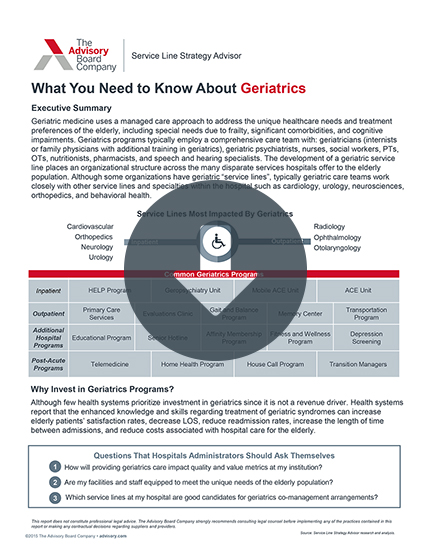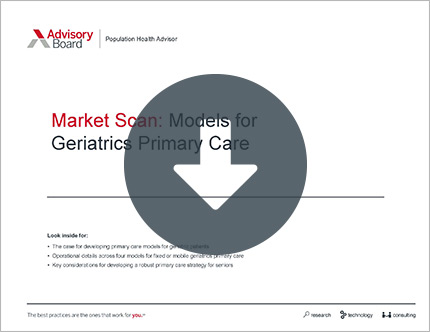Auto logout in seconds.
Continue LogoutOlder adults have long been underrepresented in clinical trials, but experts say policy changes could lead more elderly patients to participate in clinical studies—and improve the quality of care for the entire geriatric population.
Market Scan: Review the 4 main primary care models for geriatric patients
A history of underrepresentation
Research reviews have shown that older adults often are entirely excluded from clinical studies, the New York Times reports. A review of clinical trials from 1994 to 2006 found 39% of clinical trials had established upper age limits for participants older than 65. A separate 2011 review of 109 clinical trials published in scientific journals found 20% had imposed upper age limits for participation in the clinical trial. The latter study also found other potential excluding factors for older individuals, such as restrictions on individuals with multiple disorders, limited life expectancy, or cognitive impairment. According to the Times, nursing home residents are also often excluded from participating in clinical trials.
According to the Times, the rate of exclusion for older populations is significantly high for particular diseases—including diabetes, cancer, heart disease, and osteoporosis, all of which commonly occur later in life.
Geriatricians for many years have expressed concerns about the underrepresentation of their patients in clinical trials and research, saying the lack of data makes it harder to determine appropriate treatment. For instance, according to the Times, sodium intake is associated with high blood pressure, heart failure, and swelling—all conditions commonly found in older patients. But Ken Covinsky, a geriatrician and researcher, said geriatricians lack clear data on safe levels of sodium intake for their patients. "There's a lot of controversy, but that's why we need the data," Covinsky said.
Why older populations are underrepresented
According to the Times, older populations are often excluded from research to eliminate additional variables that might make it difficult to interpret the effectiveness and safety of treatments. For instance, according to the Times, researchers could find it more difficult to demonstrate the safety and effectiveness of a treatment when the study participants are taking additional drugs to treat other conditions.
In addition, researchers can better detect the effects of surgery for heart conditions in individuals who don't have multiple unrelated conditions, as many older individuals do, such as diabetes and kidney disease. According to the Times, older individuals also metabolize drugs in a different manner than younger people, and older individuals might not recover from a procedure as quickly as younger populations.
But as a result of excluding older patients, Florence Bourgeois, a pediatrician at Harvard Medical School, said, "You end up with a very homogeneous group that is not representative of your real-world patients."
How older populations might be included in clinical trials
Bourgeois said a "cultural shift in our thinking" will be required to lead more researchers to enroll older individuals in clinical trials. Bourgeois said NIH last year took a step in that direction by releasing new guidelines that, beginning next January, will require NIH grant applicants to explain how they plan to include individuals of all ages in their research. Grant applicants will need to justify any exclusions of age groups from their research.
But Bourgeois noted that many studies are privately funded and do not have to comply with NIH's policy guidelines, and she speculated that NIH's requirements would not address other barriers keeping older individuals from enrolling in clinical trials. She said, "Getting this right is going to take a lot of work and changes in how studies are structured," because older participants in clinical trials might need transportation or require home visits.
Susan Peschin, president of the Alliance for Aging Research, said FDA could play a significant role in ensuring older patients are represented in clinical trials by requiring drugmakers and device manufacturers to assess the effectiveness of their treatments among older individuals. But Peschin said that would require Congress to make "a statutory change" to bolster FDA's authority. Peschin said Congress might consider providing incentives such as tax breaks to drugmakers and device manufacturers as an incentive for companies to enroll older individuals in their clinical trials, much like FDA does for children's treatments. She said, "You need a carrot and a stick" (Span, New York Times, 4/13).
Market Scan: Review 4 primary care models for geriatric patients
For providers with value-based reimbursement, "geriatricizing" primary care is an opportunity to help manage complex care needs and increase access to care for the elderly population.
This market scan reviews four models for fixed or mobile primary care, including geriatrics clinics, providing primary care in assisted living facilities, forming house call programs, and an overview of strategies to geriatricize existing primary care practices.
Don't miss out on the latest Advisory Board insights
Create your free account to access 1 resource, including the latest research and webinars.
Want access without creating an account?
You have 1 free members-only resource remaining this month.
1 free members-only resources remaining
1 free members-only resources remaining
You've reached your limit of free insights
Become a member to access all of Advisory Board's resources, events, and experts
Never miss out on the latest innovative health care content tailored to you.
Benefits include:
You've reached your limit of free insights
Become a member to access all of Advisory Board's resources, events, and experts
Never miss out on the latest innovative health care content tailored to you.
Benefits include:
This content is available through your Curated Research partnership with Advisory Board. Click on ‘view this resource’ to read the full piece
Email ask@advisory.com to learn more
Click on ‘Become a Member’ to learn about the benefits of a Full-Access partnership with Advisory Board
Never miss out on the latest innovative health care content tailored to you.
Benefits Include:
This is for members only. Learn more.
Click on ‘Become a Member’ to learn about the benefits of a Full-Access partnership with Advisory Board
Never miss out on the latest innovative health care content tailored to you.


